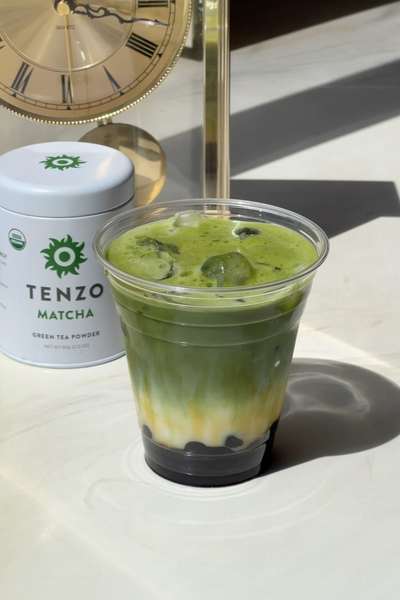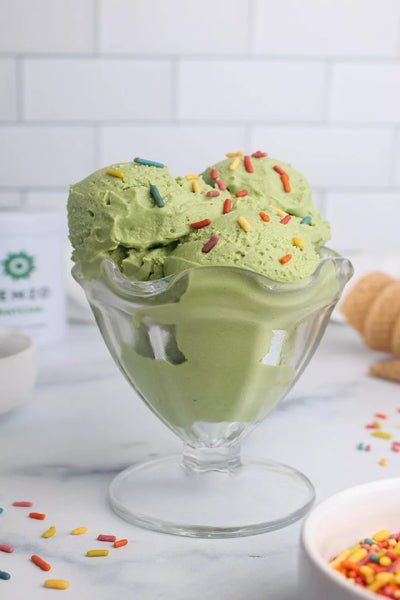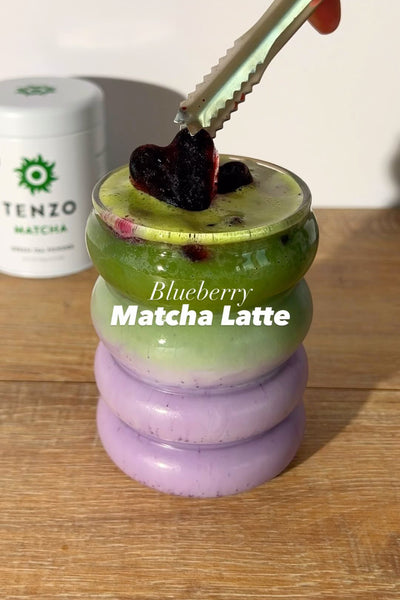Does Tea Have Caffeine? The Ultimate Guide

There are many different types of tea and each one comes with unique benefits, delicious flavors, and energy boosts that can be personalized and enjoyed any time of the day. When it comes to the tastes you love, the flavor combinations that go with any snack or meal, and the many physical and emotional benefits that tea can offer, you have a wide range of teas to pick from, each with differing levels of caffeine.
Tenzo Tea is here to help you find the perfect tea flavors for all of your health and wellness needs, whether you’re searching for an energy boost or a sweet drink to calm you before bed. Explore our wide library of information surrounding matcha tea and your tea choices and begin enjoying your next cup today.
Does Green Tea Have Caffeine?
Green tea is an incredibly popular flavor, and it’s not difficult to see why. There is a wide range of how much caffeine is available in a cup of green tea, but you’ll find it varies from about one-third to one-half of the amount of caffeine available in a cup of black coffee. That makes it an excellent option for getting a healthy boost of energy in the afternoon without worrying about staying up too late into the night.
The amount of caffeine available in green tea depends on a few important factors. Younger green tea leaves have a higher caffeine content than other green tea leaves, and you’ll find that bagged green tea is usually higher in caffeine content than loose leaf tea, due to the leaf crushing process.
Each brand and company produces green tea just a little bit differently, and the method of preparation and how long the tea is steeped for can also impact both caffeine levels and flavors. To extract as much caffeine as possible out of your leaves or tea bag, allow it to steep for longer at a higher temperature, taking care not to burn it, which can create a bitter taste.
The middle-range caffeine levels aren’t the only benefit to enjoying a cup of green tea, either. Green tea can be very helpful for relieving feelings of stress or overwhelm, and it mixes well with many different flavors, like honey, lavender, or lemon, for a morning burst or a calming scent. It’s a forgiving and versatile tea flavor, so explore your many options and begin mixing up a cup of your preferred green tea at home today.
Does Matcha Tea Have Caffeine?
On the surface, matcha tea bears many similarities to green tea. They are taken from the same plant and both present in beautiful green hues. There are a few key differences between the two types of tea, however, which show up in the way they are grown, harvested, prepared, and even served.
The growing and harvesting methods for matcha tea centralize around maintaining much of its green coloring and the nutritional values and properties that contribute to its beautiful appearance. They are grown in the shade and harvested by hand, then dried and hand sorted. The most obvious difference between green tea and matcha tea is that matcha tea is ground into a fine powder, so that it mixes into the water, rather than flavoring it.
These unique processes, from the growing to the preparation, all contribute to both the taste and benefits of matcha tea. If you’re looking for a gentle and delicious energy boost, matcha tea provides a higher level of caffeine than green tea, around 72 mg of caffeine in an eight-ounce serving, to around the 95 mg of caffeine that you’ll find in eight ounces of coffee.
Matcha tea has both physical and emotional benefits, in addition to being absolutely delicious. It can be used topically, to renew and refresh your skin, supports dental health and hygiene, and contributes to an overall sense of wellness and relaxation.
It’s also very easy to make right at home, and can be used in morning fruit smoothies, made warm or iced, and even mixed into your favorite baked goods, for a sweet, fruity note in every sip or bite. Try some new matcha recipes today.
Does Black Tea Have Caffeine?
Like green tea, black tea can range in caffeine levels, but on average provides around half of the amount of caffeine available in a cup of black coffee. Black tea caffeine levels can go nearly as high as coffee or matcha tea, so if you’re searching for a delicious and powerful energy boost that doesn’t come with a classic caffeine crash, black tea can do the trick.
As with other flavors of tea, the preparation method, including how long you steep the tea for and at what temperature, can greatly impact how much caffeine is in each cup of tea. While black tea is far less vulnerable to burning, thanks to the process for treating and preparing, it can still burn when the water is too hot or it is left to steep for too long. This will create a bitter tea taste, so it’s a good idea to pay close attention to the preparation of your tea.
In addition to supporting healthy metabolic and cardiac function, black tea has also been shown to aid in focus and intention throughout the day. When it seems that a project or assignment just isn’t getting done, a cup of black tea, flavored with citrus, spices, or fruits, might be just what you need.
Does Chai Tea Have Caffeine?
Chai tea, like some of the less potent green tea blends, is relatively low in caffeine, with just about half the amount of caffeine that you’ll find in a cup of regular black tea, or a quarter of that in a cup of coffee.
That said, chai tea is made with many bold and delicious ingredients that can give you a healthy and less intense boost of energy and focus, without any of the side effects of high caffeine levels.
Chai actually means tea in many parts of the world, but the chai tea that has taken root in western culture is one popular type of Indian tea called masala chai, which translates to spiced tea. The recipe dates back as far as 9,000 years, and many variations of this sweet treat have evolved over the generations, with influences from world travel, access to ingredients, and the immigrant experience.
Today, you can make your preferred chai tea at home with a few essential ingredients. Cardamom is the most common spice used in masala chai, and it’s the flavor you most associate with this beloved drink, but you’ll also use spices like cinnamon, ginger, star anise, and cloves, all of which make it popular for fall and winter months. Experiment with other ingredients like nutmeg and fennel to find the flavors you love most.
While the caffeine boost is relatively low, the energy from the spices and bold flavors can help support you through a busy day, and each sip delivers on sweet, spicy tastes that make it easy to love chai tea.
Does Oolong Tea Have Caffeine?
Oolong tea falls between green and black teas on the scale of caffeine, usually on the higher end of matcha tea caffeine levels. It can also come with significantly more or less caffeine if you’re on the search for fruity and sometimes floral flavors, with or without the boost of energy.
While oolong tea is harvested from the same plants used for black and green teas, it is processed quite differently, which makes the taste much lighter and less intense than drinking green tea. While it may share some of the fresh, grassy flavor profiles, your oolong tea should not taste like a cup of green tea. If it does, you’ll want to go through the tea steeping and preparation process again.
There are many reasons to love a cup of oolong tea. It can help to maintain and improve your health, reduce the appearance of blemishes on the skin, and even support dental health and hygiene.
Oolong tea is not one of the most popular teas. In fact, it makes up less than 5% of the tea consumed worldwide, but in addition to tasting light and delicious and offering wellness support, it can act as a low-impact source of energy, for managing late meetings or starting your morning with a slow, gentle wake-up.
Does White Tea Have Caffeine?
White tea is classified as a type of green tea and earns its name because it is harvested from young leaves which are still coated in white hairs. The harvesting process isn’t the only thing that sets white tea apart from green tea, however.
Like all teas, the amount of caffeine and intensity of white tea can vary greatly, depending on how much you brew, how long you steep it for, and the heat of the water you use. There is even a difference in how much caffeine a cup of white tea brewed with loose leaf tea will have when compared to white tea brewed from a tea bag.
White tea is unique from its bolder, more intense counterparts in several ways. To start, it usually has less caffeine than green tea, and it also has a wider range of caffeine content, from as little as six milligrams of caffeine in an eight-ounce cup to around fifty or sixty milligrams of caffeine in an eight-ounce cup.
If you’re looking for a truly caffeine-free white tea, there are decaffeinated versions, but even those will still have some caffeine content, however small. It is difficult, if not impossible, to brew completed decaffeinated tea at home, so consider ordering it when you’re out or trying the many herbal tea options available, instead.
Another important feature of white tea is its taste. It’s impossible not to love such light and aromatic flavors, with scents and tastes of honey and fruit. White tea will make you feel refreshed, even with a low caffeine content.
Does Jasmine Tea Have Caffeine?
Jasmine tea is a unique option for tea lovers because it is incredibly versatile and combines the sweet, aromatic flavors of the jasmine plant with beloved tea flavors to fit your preferred tastes.
When jasmine tea is completely pure, it actually doesn’t have any caffeine at all, but jasmine tea today is often mixed with other teas, most commonly a variation of green tea, which can help to boost its delicate flavors. The combination of teas means that jasmine tea can have a wide range of caffeine levels, depending on what it has been mixed with and how the tea was prepared.
While it is relatively uncommon to mix jasmine tea with herbal teas, doing so can provide a delicious jasmine tea drink without any caffeine at all. You can also explore your base tea options to find a low-caffeine mixture that still offers up the best of jasmine tea flavors and experiences.
Jasmine tea is also known for boosting your health, improving wellness, and supporting your immune system, so consider a jasmine tea next time you want to feel invigorated.
Does Chamomile Tea Have Caffeine?
There is a reason why chamomile tea is often touted as the best tea for bedtime. Chamomile tea is completely without caffeine which makes it a delicious choice for relaxing at the end of the day and enjoying sweet and fresh fruity flavors without adding any sugar or additives to your diet.
You may find that a well-brewed cup of chamomile tea actually has hints of apple and spring-based floral flavors, but it is also very delicate, and pairs well with many afternoon tea dessert favorites like scones and madeleines. You can also add some of your favorite ingredients, like honey for sweetness, lemon or ginger for a bright burst of flavor, or even a dash of cinnamon.
In addition to the bountiful flavor profile, chamomile tea is known for providing physical and emotional health support. It can help to improve healthy digestion, boost metabolic function, and lift immune health. Most importantly, it can relieve feelings of restlessness and tension, so you can enjoy a full and restful sleep and feel refreshed in the morning.
Does Peppermint Tea Have Caffeine?
Peppermint tea is another excellent option for a naturally caffeine-free tea drink that is versatile and beneficial to your overall health and wellness. Unlike some of the more delicate caffeine-free tea options, peppermint tea is a bold and exciting flavor that can help you feel refreshed and ready to face the day.
Peppermint tea is harvested from the peppermint plant, which is why you can trust that it’s always caffeine-free. Many of the products of the peppermint plant are known for their great health and wellness benefits and supportive properties.
Because it has no caffeine, peppermint is a good option to drink before bed, as it can help to contribute to an easy and fulfilling rest. It can also help to improve and support heart functions and is beneficial for relieving tension and improving your overall mental health.
Does Herbal Tea Have Caffeine?
While herbal tea is not technically tea, as it does not come from the tea plants, it is an incredibly versatile and delicious option for tea and you can adjust it to fit your favorite flavors, your health needs, and what you’re enjoying as an afternoon snack.
Rather than being made up of tea crops, herbal tea is a combination of flavors derived from many different types of ingredients, including fruits, leaves, barks, or even flowers, which means you have many different choices to pick from.
The flavors available in herbal tea can vary widely, but you want to be careful when brewing because the ingredients are often more delicate than traditional tea leaves and they can burn more easily. Herbal tea is also an excellent addition to many desserts and beverage recipes and can be made chilled or hot for the cozy winter days or summer picnics with friends. Try out cakes, smoothies, and celebratory punch recipes with your favorite herbal tea flavors today.
Does Ginger Tea Have Caffeine?
Ginger tea has warming qualities and flavors that you’re sure to fall in love with from the very first sip. Ginger tea is a type of herbal tea. Rather than being produced from a tea plant crop, it’s made with ginger root, which gives it the bold and spicy flavors that are both delicious and helpful in promoting overall health and wellness.
Ginger is known for many health benefits. It may aid in relieving tension in the head and neck, can help to provide support for hair health and reduce the appearance of blemishes and facial puffiness, and can even help to boost your immune system. Most notably, ginger is famous for its digestion soothing properties and calming support for motion sickness.
There’s no denying that ginger tea is also delicious. Give it a summery spicy flavor boost with a splash of lemon or settle into a fall flavor profile with apple and cinnamon.
What Tea Has the Most Caffeine?
Tea dates back thousands of years and has evolved over time, with many unique combinations and flavors becoming available. There is a wide range of teas at our disposal, many of which can be easily brewed at home, each offering its own unique physical and emotional health benefits.
In addition to many beautiful and delicious flavors, from florals to fruits, there are also many different levels of caffeine in your favorite teas. The average cup of coffee delivers up to nearly 100 milligrams of caffeine, and most teas will be a little bit less than that. Each has its own variation, depending on the crop, how it was produced, how long it was steeped for, and whether loose-leaf or bagged tea was used.
Black tea and matcha tea have the highest levels of caffeine available in a regular cup of tea, with up to 70 or even more milligrams of caffeine. In the strongest combinations, black tea can even have more caffeine than a cup of coffee, but usually falls somewhere in the middle.
Matcha tea is produced with the same crop that is used in green tea, but because it is ground into a fine powder and mixed into the water, rather than being steeped, like a traditional cup of tea, it is also highly caffeinated for tea.
If you’re looking for more medium caffeine levels, chai and oolong can be good choices for your needs, and jasmine tea, depending on what base is used to mix it. And if you’re on the search for a health-boosting drink that doesn’t add any extra caffeine to your diet, then explore your herbal teas, like ginger and peppermint.
Conclusion
There are many reasons to reach for a cup of tea to start your morning with a healthy and delicious boost or to enjoy a restful sleep. Tea has a wide variety of flavors and caffeine levels, and you can mix and match your favorite flavor profiles to find the ones you love and to add the spices and fruits that combine well with breakfast or midnight snacks.
For more information on matcha tea and the health benefits and wellness boosting support that tea can offer, trust Tenzo Tea. We make it easy to find the flavors and information you love to feel energized, avoid frustrating crashes, and get the physical and emotional support that really lasts. Begin exploring our growing library of matcha drinks and find out what makes tea such a perfect fit for your diet and your life today.
Sources:
https://www.healthline.com/nutrition/caffeine-in-green-tea#TOC_TITLE_HDR_3
https://www.thespruceeats.com/the-history-of-masala-chai-tea-765836
https://www.realsimple.com/health/mind-mood/emotional-health/chamomile-tea-benefits










